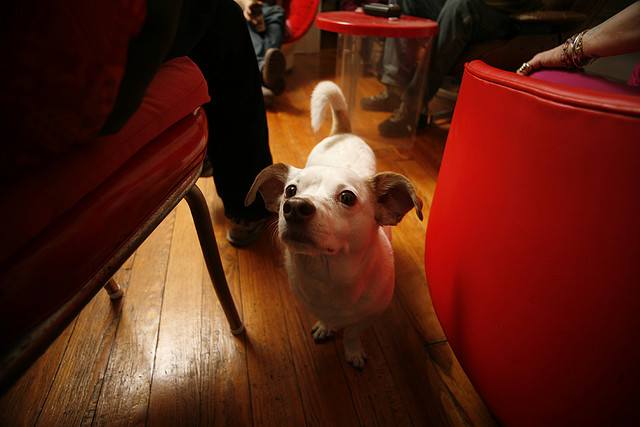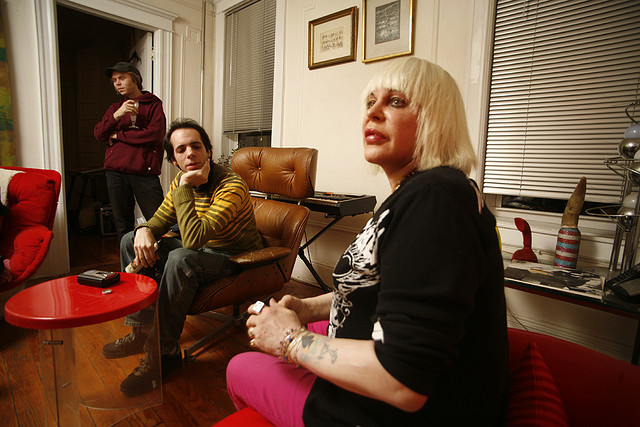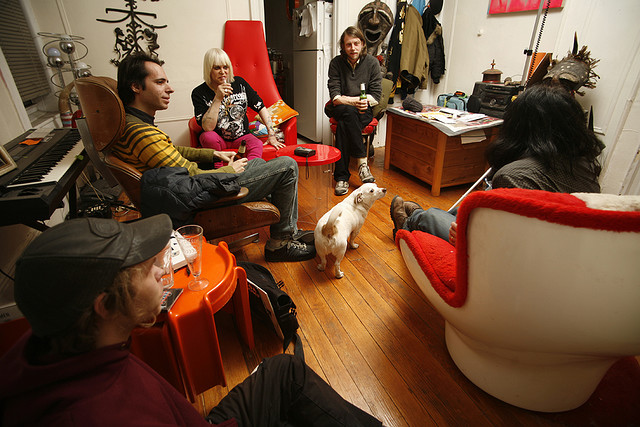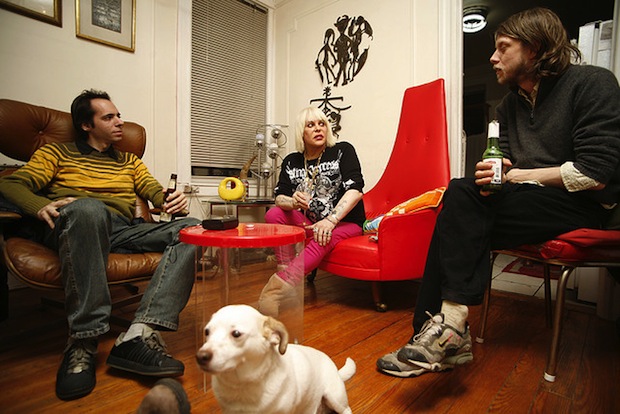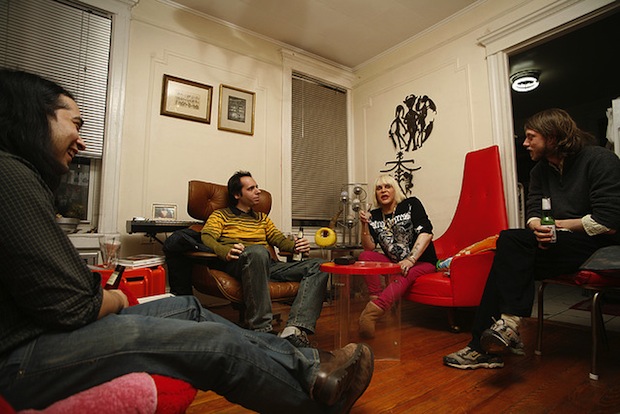Photos by Lloyd Bishop
Interview moderated by Alan Licht
Before we get into the next chapter of our rather epic Black Dice/Genesis P-Orridge interview, here’s a reminder of who’s who here:
GPO: Genesis P-Orridge
BC: Bjorn Copeland
EC: Eric Copeland
AW: Aaron Warren
AL: Alan Licht
A taste of what’s discussed this time around: Lightning Bolt, Auto-Tune, lepers, Arctic Monkeys, borrowed equipment from a certain Beatle, William S. Burroughs, holophonic sound, Winona Ryder’s dad, Steve Winwood’s brother, getting “psychedelicized,” TG’s breakup, “Discipline,” and getting paid in cigarettes.
And now, we resume our feature presentation, which was previously in-progress here…
“The Internet’s not a physical relationship. That’s the main dynamic–like jerking off to porn isn’t the same as a lover.”
GPO: In 1966, we would have to save up money secretly by selling drugs, and then hitchhike to London, and then go around Soho that night looking for a porno shop that might have a William Burroughs book in it by mistake, and then buy that book. But in that journey, all the time we’d find people who would let us sleep on their floor, or we’d talk to them about what they did or where they’d been, and maybe make friends with them, and we’d find all these other places we’d never knew existed, or we’d meet people while we were hitchhiking and we’d hear their stories…Do you think it’s the same journey on the Internet?
EC: Part of me feels like, no way, you can’t trade any sort of experience for:You know, if you go to YouTube all these recommendations come up when you’re done watching a clip. Depending on my mood, I put value on that or [I don’t]. Sometimes I’m willing to just be like, this is the journey:I’ll be on some Japanese sex site in two clicks, but at the same time it won’t be like hitchhiking.
AL: But it will lead you to things:
GPO: YouTube is definitely one of the most dynamic of the forums, I think, don’t you?
AW: Social networking is something that’s for a younger generation than any of us. I’m personally not interested in talking to anybody on the Internet that I don’t know. But if you’ve grown up with that, you’re totally comfortable with it. If you’re searching out some William Burroughs shit, you might also meet someone across the world whose interested in that and you can forge a real relationship with that person.
GPO: But you wouldn’t have met them if you had to go physically there.
AW: Yeah, you would have never encountered them at all. That’s some shit that I don’t take advantage of ’cause it’s too foreign a concept to me.
EC: It seems really obvious but the Internet’s not a physical relationship. To me that’s the main dynamic–like [how] jerking off to porn isn’t the same as a lover.
BC: I feel like everybody finds out about shit at their own rate. It’s kind of similar to why the whole school system sucks in this way because you’re forced to look at things that you certainly need to know but you don’t have any interest in it at the time. After I finished school, I felt in retrospect like I definitely wouldn’t have slept through every art history lecture.
GPO: Did you all go to RISD?
BC: Eric almost did. We started playing when he was in high school.
GPO: You’re from Rhode Island?
EC: No, I’m from Maine…Aaron and I both went to school in the city.
GPO: Where did you go?
AW: NYU.
GPO: What did you study?
AW: I studied film, Eric studied religion.
EC: I studied, like, the Bible.
GPO: Really?
EC: It took me three years to realize I didn’t want to be a Bible scholar, but I got the education that I lacked. And actually I follow these ideas a little more now. It was a good foundation.
GPO [to Bjorn]: And what about you?
BC: I studied sculpture. Which is why I’m broke as shit and always on the verge of eviction [laughs]. [Rhode Island] was where we started; there was a lot of really energetic, fucked up bands. It was interesting cause no bands would come to Providence and play, but just through our friends we saw some really amazing shows that were encouraging for us.
GPO: When we started TG there were the Cabs, and SPK, and Clock DVA:
BC: Were Esplendor Geometrico around yet?
GPO: They came a little bit later, but we had that little network. We didn’t even play the same style, but we put each other on shows as support bands. Did you have a little coterie of friends, or bands that started out at the same sort of time as you?
AW: Yeah, for sure.
BC: They’re all bigger than us now though [laughter].
GPO: Who are they?
BC: Lightning Bolt was the band we did our first tour with. They’re amazing at what they do…
EC: They’re like superheroes.
BC: They’re super-DIY, the aesthetic is really Gary Panter[-like]–sort of tripped out cartoon stuff and they’re both…
AW: Virtuosos.
BC: Yeah, they’re sort of like throwback musicians in that way. I don’t really like Rush and shit like that, but in my head I like the idea of superhero musicians and what that represents to a kid. I don’t like Kiss but I could see why if I was ten or eleven why that would seem like the coolest band:and Lightning Bolt serves all of those purposes…We’ve been extremely fortunate. [Lightning Bolt] was one of the first bands that we played with–[them] and Wolf Eyes, Animal Collective, Gang Gang Dance:it made it a lot easier to tour to have a couple of friends around when you knew the audience was going to fucking hate you at like 99-percent of the shows.
GPO: Have you seen a change in the way gigs are organized?
AW: Yeah, sure. Even with the kind of tour that we’re interested in doing right now, we have a pro booking agent but we’re actively always trying to find the least pro places to do the shows. It doesn’t make any sense in a way because it’s totally against our interest. We need the money to do the tour, but at the same time we need to have a tour we think we can live with.
GPO: [Like] that one [at Market Hotel in Brooklyn] where Gibby [Haynes] was DJing–
AW: Yeah, totally.
BC: The tools have changed…With the Internet, I feel like we’ve seen the first wave of bands that got really popular based off a MySpace page.
GPO: Like Arctic Monkeys.
BC: Like Arctic Monkeys, Clap Your Hands Say Yeah, Lily Allen–all these things. I just don’t know how long that stuff can really stay around. It’s fantastic to do something that people can connect with, but if it’s at the cost of your ability to grow as a person or as an artist, it sounds like a bad idea. And at this point there aren’t that many bands that are around for over a decade.
GPO: That’s another question we’ve been curious about: longevity. Things surge upwards really fast in this environment, and they also disappear really fast as well. They seem highly disposable on every side. And that’s accelerated incredibly; people would find a band and be loyal to it, and watch it grow into different albums–see them get more experimental, more melodic or whatever…Now that seems quite unusual.
AL: I think you’re right that it’s accelerated, although that’s always been the case [with pop music]. A lot of people are just one-hit wonders:
BC: Yeah, there’s that cycle of something else always coming up. The Internet certainly accelerates it, in that you don’t have to wait three months to find out what band sounds like the Arctic Monkeys. You can find out instantly.
GPO: So, in 20 years, will there be as many people listening to the Arctic Monkeys as [there] were the Beatles 20 years later? I just wonder what the longevity of the music itself really is. At the moment, with all these different things happening, and the major labels, they’re really falling apart:
BC: Yeah, we did a stint on EMI and it was:a humbling affair.
GPO: Yeah, we had a couple of terrible experiences with major labels as well.
BC: It made us sort of feel like idiots:Everyone who had put out records by us in the past liked us for specific reasons that they could articulate to us, and with them, we knew they had no idea.
GPO: Are we seeing the end of music having any sort of global appeal? Is it going to become lots of little tiny islands that just float to the top and then sink away?
EC: But why do they have sink away if…
GPO: In terms of attention from people, that’s all.
EC: But that’s the thing…me continuing to make music doesn’t require an audience, except in this idea of being a band, where if people don’t like you, you can’t be a band [laughter].
AW: No one told us that [laughs].
“All I could hear was white noise and I just thought fuck it. So I just started banging the guitar and kicking it.”
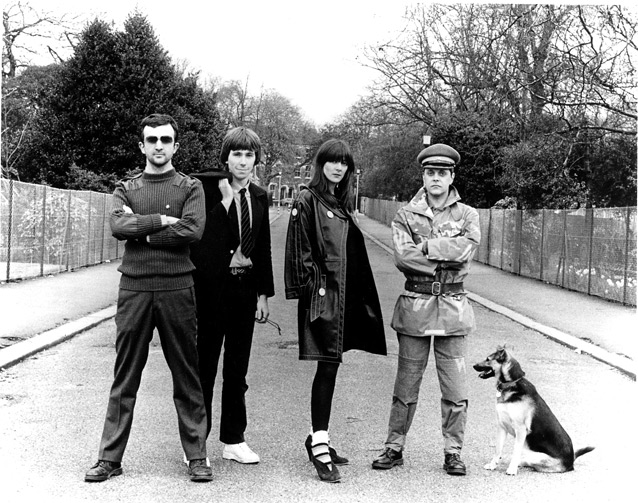
GPO: We’ve never relied on music to make a living, because we knew we couldn’t [laughs].
EC: Except you’re playing Coachella.
GPO: That’s a fucking weird thing, isn’t it? After 35 years [laughter]. If you take that fee and spread it out over 35 years, it’s not much, is it? [Laughter]
AW: When did TG break up?
GPO: TG broke up in ‘81.
BC: And that was in LA, or San Francisco?
GPO: [Laughs] There are different versions of this story, so:this is just my personal version, which has one person who agrees with it–Monte Cazazza. We were walking to this radio station prior to the LA gig, and I said to Monte, “I’m not going to do this anymore after these two gigs.” I said I’m going to tell them on the radio. So when the guy says on the radio, “So what’s in the future for Throbbing Gristle?” I piped up and said, “Nothing.” [Laughter]
Three people turned around and went [makes face; everyone laughs]. And there’s a photo of that, with Monte behind this window, laughing his head off [laughter].
BC: You know what’s funny is when I read about Throbbing Gristle gigs in that book Wreckers of Civilisation, which is a dense motherfucking read.
GPO: It’s a good read.
BC: It is a good read, but there’s a lot of fucking information in there:the amount of records you guys were selling was substantial, though, by American independent standards.
AW: Especially modern standards.
BC: And the size of the gigs too, at least the LA venues, that’s like indie gold, from that time up to the fuckin’ ’90s, really.
GPO: I don’t think we ever got more than a thousand dollars for a gig. And that was probably just the last two.
EC: I bet it could be as low as 20 quid or something like that [laughter].
GPO: It was–there were things that were just like 30 pounds or something.
BC: We got paid in change many times, and cigarettes, and we don’t even smoke cigarettes.
AW: When I joined the band four years in or something, it was at least another four years [until we made $500 for a show].
BC: I get totally pissed when we invite friends to play a gig with us and they get all heavy about money, or they bitch about stuff. I’m like, “You motherfuckers, do you know how long it took us to get paid $100 to do a fuckin’ show?” [Laughter]
GPO: The only gigs we did outside of England were two in Germany–maybe three in Germany. Don’t remember what we got paid for those. But we got travel expenses plus a little bit. But we slept on the floor of a warehouse and stuff like that.
BC: We do that pretty regularly.
GPO: And the two gigs in America. There were only five outside England.
AW: So you’ve only played two shows in America until this upcoming [short tour]? And you never played in New York? That’s wild.
GPO: No, no, we just did LA and San Francisco.
BC: That San Francisco show–did you identify at all with the bands that were playing?
GPO: Well, Flipper–I thought Flipper were great.
BC: One of my good friends was tight bros with one of those guys, the dude that died…
AL: Will Shatter.
GPO: We met the Flipper people through Monte.
EC: Didn’t Black Flag play that show?
GPO: Black Flag did the LA one. And Don Bolles–after the Germs, after Darby died, Don Bolles started 45 Grave, and they played in LA as well.
AW: Shit, what was that venue?
GPO: Veteran’s Auditorium, Culver City.
AW: Fuck, I used to live in Culver City.
GPO: Uh, to me it was a disaster, something went wrong with the PA, and all I could hear was white noise and I just thought fuck it. So I just started banging the guitar and kicking it [laughs].
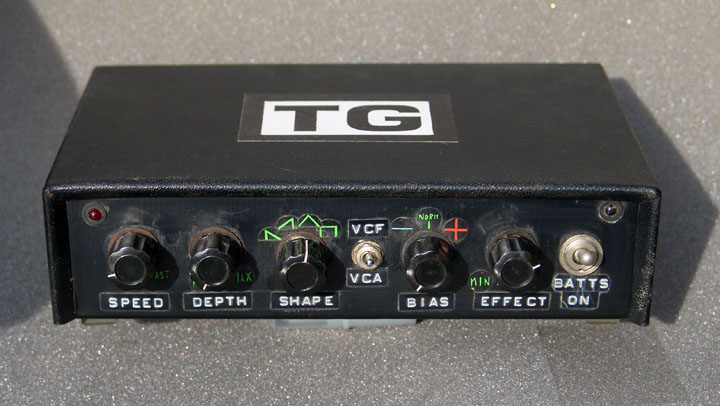
BC: This is totally nerd shit, but did you guys go direct most of time, into the PA? I’ve seen pictures of you doing feedback off the monitors, so I figured it must be going through DI.
GPO: What we mainly did by the second half of TG, we wanted to miniaturize–it started as a joke, you know how the progressive groups had the biggest drum kit, and the biggest PAs and the biggest keyboards? We thought, “Let’s make everything as small as we can.” So we each had just a flight case, and the lid had the pedals on it, there’d be a little tiny monitor in it, so you could hear what you’re doing, you had one Gristle-izer, maybe a little echo thing, and you plugged into that. So when you set up, you just took the lid off, put it on the floor, plugged it in, sent the DI, and that was it.
AW: That’s awesome.
EC: We could have learned that lesson a long time ago [laughter].
AW: Did you ever have any problems at airports? Nowadays that’s a real problem for us.
GPO: No, they weren’t worried about it then. It just went on as normal luggage. Sometimes they opened it up and said, “What the hell’s that?”
EC: They never made you play it at the airport? [Laughter] I remember Detroit, once, we had somebody say “sing for us.†[Laughter]
AW: That was right after 9/11.
BC: If they ask you what it is and you just say, “I make beats with it,” that’s like layman’s terms [and] they’ll let you go through.
GPO: It was much more fun to play when it was simplified like that.
EC: Is it the same four people playing these Coachella shows as well?
BC: And Sleazy does Coil?
GPO: Yeah, m-hmm. Not now though, because Geoff [Rushton, aka John Balance] died, so he’s now called SoiSong, and working with this–is it Danish?–guy:it’s just the two of them, it’s all ambient, using two laptops.
BC: We were asked to play the first RE-TG fest.
AW: The one that got cancelled.
GPO: I know, that was such a mess
AW: Yeah, yeah yeah, we were bummed about that. We were really psyched:
GPO: We were too. And then when they finally got us there they treated like:no, I can’t say that, can I? [Laughter] It wasn’t much fun, let’s just say that.
EC: I have a question for you–do you play music every day?
GPO: Me? No.
EC: How often do you play then?
GPO: Do you mean in the background?
EC: No no, I mean how often do you just kind of sit around, and make music?
GPO: Never.
EC: When was the last time?
GPO: The last gig.
EC: That’s fair. [GPO laughs] Do you draw, do you make collages everyday?
GPO: Oh yeah, pretty much. And write.
EC: What do you write?
GPO: Poems, essays, articles for magazines, books:
AL: Lyrics?
GPO: Well, lyrics, yeah, when there’s songs to do.
AL: When you’re recording a record?
GPO: Yeah. But a lot of the things in the notebooks–poems and ideas–turn into lyrics later. Or else I’ll say, what shall I sing about today? [Chuckles] That’s how “Discipline†happened. We were in Berlin, turned around before we went onstage and said, “What shall I sing about, Sleazy?†And he goes, “Discipline.†I said, “Okay,” [laughter] and I went onstage and made it up on the spot. And it worked. A lot of them are made up onstage.
AW: Have you had ones that…
GPO: That don’t work? Oh yeah. Yeah [laughs]. But amazingly, a high number of them are okay.
AW: The good ones aren’t good unless you’ve had some bad ones, basically:
GPO: You can’t cheat. You’re there in front of the audience and there’s all this energy funneling in, and what we try is basically channeling, just being lost in it, going into a trance. When we’re making up lyrics, basically it’s describing a film in my head, and telling people what I’m seeing. That’s kind of how it works. When [Psychic TV] did “I.C. Water,†the one about Ian Curtis, we painted the wall gray, put the microphone right against the wall, and I stood like this and faced this gray wall for about an hour, then said, I’m ready, and then sang it straight down on tape. And that was it–one take.
AW: Did you have [your own] studio setup?
GPO: Second Annual Report was recorded on a Sony cassette.
AW: Something like this [points to Alan’s tape recorder]?
GPO: Slightly bigger. In those days, they were bigger. Put it on a table in the back of the room, and that was it.
AW: That’s cool.
GPO: And it’s never been out of print since.
EC: Who put it out?
GPO: We did.
EC: You guys have kept it in print the whole time?
GPO: No, since then it’s been licensed to other people.
AW: You mean you took that cassette tape and you gave it to the record place and…
GPO: Said, “Can you make this into an album, please?” [Laughter] It was Burroughs that suggested that.
EC: All his stuff’s at this place that I work that has all that Psychic TV stuff. There’s a lot of Burroughs stuff being reissued right now–a lot of spoken word stuff.
GPO: It’s not Nothing Here Now But the Recordings, is it?
EC: I don’t think so. I would describe the cover, but a black and white photo of William Burroughs probably describes most of them [laughter].
AW: I was just listening to 20 Jazz Funk Greats. You kind of had a more pro setup [for that one]?
GPO: No, that was done on Paul McCartney’s:we borrowed his 16-track from Mull of Kintyre, his island. Sleazy’s other job was [designing] for Hipgnosis. He’d just done the Venus and Mars cover for Paul McCartney, so Paul was really happy with Sleazy. And Sleazy says, “my band’s looking for a better tape recorder†and he goes, “Oh, I have a 16-track at my farm, the Mull of Kintyre, you can borrow that if you want.â€
So they shipped it down, and we dragged it into the basement in the Factory–our Death Factory–and it had mold, moss and stuff on it [laughter], it really was from the farm. So we had to scrape it clean, but it worked.
AW: It’s got a good sound, that record.
GPO: It’s that two-inch, 16-track tape.
EC: But all that Psychic TV stuff–is that the same Sony recorder?
GPO: Yes.
BC: Really?
EC: You got some mileage out of that.
GPO: Once in a while it came through the mixer but we preferred it when it was just a cassette deck.
AW: Holy shit.
BC: Wow.
GPO: A lot of it’s been reissued on CD.
EC: I was gonna say, it seems like I just updated a website [laughter].
GPO: It just goes to prove that there’s something other than professional quality involved.
BC: I feel like the professional standards are the ones that become dated the most quickly, that’s why I like everything that’s on the radio now, there’s a 100-percent guarantee you’re gonna hear an Auto-Tune on a vocal if you turn on hip hop stations.
AL: It’s like hit radio from the ’80s…
GPO: When they used to use aural exciters. In the ’80s, Fleetwood Mac used them a lot. It was this weird effect that you could use in a studio and put all those [hisses] kind of high sounds in it. ELO used it as well. Everybody used it on the hit records. It was almost like a magical thing; it somehow made people really like it [laughter]. It had a strange effect, like a drug almost, where people felt attracted to things that had this hissy, high-pitched sound.
AL: The thing about high end, also, is, I was reading about how massive cocaine use really damages your hearing so you can’t hear high frequencies as much. People who were engineering records back then had done so much cocaine that they would be in the studio and go, “I can’t hear any highs†and they’d be pushing it up in the mix.
GPO: Oh, is that where it came from, the aural exciter? So should we call it the cocaine exciter? [Laughter] We tried it, it didn’t seem to make any difference to us.
BC: We tried to use an auto-tuner–and Nicolas [Vernhes], the guy we were recording with, was like, “Fuck you.” [Laughter]
GPO: Like on that Cher record (“Believe”)?
BC: [That] was the big one–the best use of it, too.
GPO: Yeah, that was new. Even we went, “Wow.†But whatever happened to holophonic sound? Dreams Less Sweet is still the only album in the world that was completely holophonic.
EC: What’s holophonic?
GPO: Dimensional sound.
EC: When did that come about?
GPO: We recorded that in ’83, so [the] early ’80s. This guy called Hugo Zuccarelli invented this special new way of recording sound. Part of it was a real human skull, with latex skin and real human hair, called “Ringo†cause it was the skull of a Mexican boxer called Ringo who died in the ring. Which is:interesting. Not really useful to the sound, [laughter] but:inside that, he had little bags of liquid where the inner ear is, so he tried to construct as near as he could an entire person’s head with a sack of liquid for the brain, and so on. And right in the center of that was something, which he wouldn’t tell, and he hid the papers all over the world, which went through a wire and into a black box. And in the black box, the digital information from this whatever, was changed back into code that could become sound again.
EC: Analog?
GPO: No, this was digital:three-dimensional digital, it was the first time ever it had been done. Pink Floyd used it on:Meddle, maybe?
EC: Did you need a special player to understand this?
GPO: Oh yeah, when we used it, Sony brought an entire mobile studio they built specially, and the tape was circular but it was twice this diameter.
AW: Bullshit! [Laughter]
GPO:– And it was only this thick; it was really strange.
AW: That has gotta be mega-expensive.
GPO: Well, they did it for free, because they’d been trying to get people to do it on a whole album and no one else would. Pink Floyd used it for sound effects only, and Michael Jackson used it on Thriller but only for the sound effects, and we said we’ll use [it] for the whole fucking album. So they created this whole studio for us, at this place called Jacob’s.
We tried all these things–we put it in a coffin, buried it, so you can hear yourself being buried alive, on the record, and we got this guy from a film studio to come with a license and fire guns past its ears so you could hear bullets flying past:all kinds of stuff. We did a tattoo on it [laughter]. We got clippers and pretended to cut its hair, we put it on a rope and swung him so he was flying around the studio while we played live so it was recording wherever it went.
EC: And what happened to all this?
GPO: It came out, it was released as an album:on CBS.
EC: On C:[laughter] Let me ask you this, what type of dude are you dealing with where you can propose all this shit and he’s cool with it?
GPO: Muff Winwood, Stevie Winwood‘s brother.
AW: Ah shit, really?
EC: This gets better [laughter], what’s the:
GPO: Well, the intermediary was Stev-o, at Some Bizarre, who had this moment, in the ’80s, of being really hot because he had Soft Cell. He released “Tainted Love,” the original, and got loads of money from that. So all these major labels thought he’s got his finger on the pulse. So he got Einsturzende [Neubaten] a major deal, he got us a deal, he got the Cabs a deal:incredible. He had golden fingers for about two years. And that’s how we could afford to do this thing.
AW: Was everyone doing a high budget record?
GPO: High budget weird record.
EC: I’ve never heard of that type of music getting that sort of:
GPO: It was very funny, we went into the Hell Fire Club caves, because Zuccarelli reckoned it would pick up atmosphere as well; we recorded in the place where Aleister Crowley did his Rites of Eleusis and gave out magic mushrooms; we recorded in a church with an opera singer. This choir, they were actually singing Craft Ebbing’s “Psychopathia Sexualis,” so if you translated the Latin it was actually about a woman who had a perversion about young boys. It was wild, we couldn’t believe our luck. And the more ridiculous the things we suggested, the more they’d go, “Yeah, that sounds great, we’ll organize it for you.†[Laughter].
EC: What was their reaction?
AW: Was there a fallout afterwards?
GPO: No, no they liked it a lot. The fallout came [laughter] when we said we wanted to release “Godstar†as a single.
AW: But you did release that as a single.
GPO: On our own label. Muff Winwood said, “I don’t like it, it will never be a hit, why can’t you do something more like that other one, Dreams Less Sweet?” We said, “Well, we think this is a really good song…Muff Winwood, you couldn’t sell records if you were a fucking chimpanzee, we’re not on your label anymore,” and walked out. Went and formed my own label and released it and it was number one in the indie charts for 15 weeks.
AW: That was a huge record.
GPO: Went into the national charts as well. He was wrong! Fucking idiot.
EC: Did you ever hear the Television Personalities version of that?
GPO: Oh yes–yeah, because we met them on tour.
EC: That was how I heard that song.
GPO: They told us they did it, but I haven’t heard that. [Sings] “This is a story, a very special story, it’s about Brian Jones, one of the Rolling Sto-oo-ones.” [Laughs] What a great intro. That came out onstage, I made it up onstage…We played the Hacienda, and Alex Fergusson suddenly went da-da-dunh, that sort of Keith Richards-y thing. And I’d been thinking about Brian Jones, I’d read a book about him, so that was my subject, and I just sang this fucking song.
Afterward everyone goes, “Oh, what was that new song? The one about Brian Jones?†“Oh I don’t know, I don’t remember what I said.” So then we were all scrambling around before people left the venue, “Did anybody record that?†[Laughter] Luckily we found someone who had a tape, and then I took it home and I transcribed what I’d sung, I didn’t remember singing it at all.
EC: What about the cover of “Are You Experienced?”
GPO: With Caresse, my daughter? Isn’t it great?
BC: Oh my god, she’s gorgeous:it’s an 8 year old girl singing, and she’s dressed up like an Indian or something like that:
GPO: And she pretends to take a tab of acid and put it on her tongue. It’s slowed down; it’s the Quaalude version [laughs]. That ended up being the theme music for an Italian pop music show for about two years. She was a big star in Italy [laughter].
BC: How much shit did you get for:
GPO: Oh, we got shit for that, yeah.
AW: Did that ever come down to legal crap though?
GPO: They threw that into the mix when they chucked us out of England, it was all sort of:innuendo.
AW: Where did you have to go when you got…
GPO: I was already in Katmandu. I got a phone call saying “you can’t come back†[laughs].
EC: I figured you would have had the customs agent going, “Nope.†[Laughter]
GPO: You want to know why that happened? The thing that’s ironic is we were in Katmandu using our PTV royalties–from “Godstarâ€, funnily enough–we felt guilty about making money [laughs]. So we went there through these Tibetan Buddhist monks we knew, and we financed a soup kitchen all through the winter, for the refugees from Tibet, and lepers and beggars and little children that were orphans. We fed them three times a day–sometimes 3 or 400 people. We got all our fans to send clothing, so they could keep warm. And it was while we were doing that we were told we were the most evil people in Britain and couldn’t come back [laughs].
I was sitting on the bed thinking, what do I do now? And my eyes caught this envelope with all these old letters in it. As we were leaving the house to go away, I just put all the mail in an envelope and put it in a bag. So I started going through [it] ’cause I was kind of in shock, and there’s one there from Michael Horowitz. So we open it, and inside there’s a postcard, which says: “We were at the gig at Dingwall’s, and it was the most psychedelic thing we’ve seen since the Acid Tests in 1966. If you ever need a refuge, call this number.†We went back into the town, because there was only one place you could phone outside, phoned up Michael and said we need a refuge, me and the kids. And he goes, “Okay, can you get to San Francisco? If you can get here, we’ll pick you up, you can stay with us.” Then I rang Wax Trax, and said, “I need tickets for me and the kids, one way to America, could you front the money?” They said okay. So that’s how we got here. And Michael Horowitz is the person who hid Timothy Leary’s archive when he was in jail, and also is Winona Ryder’s dad.
EC: She’s dead?
GPO: No, it’s her father–her dad [laughter]. So her parents let us stay in her old bedroom.
AW: That’s fuckin’ wild.
GPO: And then, because we were staying there, Timothy Leary rang up and said, “Why don’t you come and visit me in LA? I’ve got a car in their back garden, you can have that.” We looked and there was an old Honda, and the license plate said “Hi-Orbit.” We got that fixed so it would run, and drove it down to LA, stayed with him for a while, and started doing these events with him. “How to Operate Your Brain,” we did all the video and sound for him.
BC: Oh really? I love that clip that was on YouTube. Were you interested in what he was talking about as practitioners?
GPO: You mean were we psychedelicized [laughter]? Yes, we were, absolutely:and continue to be to this day [laughter].
Check back later this week for the rest–no, really–of our Black Dice/Genesis P-Orridge interview.
